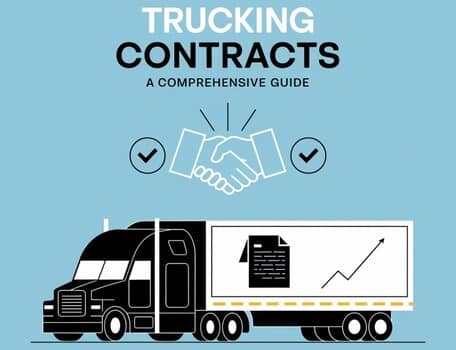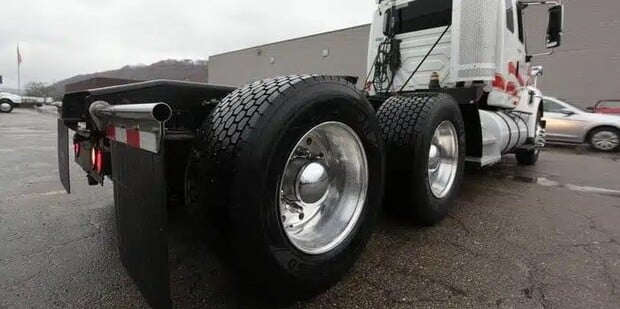

August 11, 2023

1528 Views

9 min read
How-to Guide for Getting Trucking Contracts
Page Contents
Trucking is a highly sought-after service both nationally and globally. Almost every business needs it for supply chain, production, or product distribution. Since trucking services are in such high demand, the competition for trucking contracts is fierce. It takes work to compete with well-established players in the trucking sector.
Understanding the process of obtaining trucking contracts forms the bedrock of a thriving trucking business. In this how-to guide, we will delve into effective strategies that will help you secure profitable trucking contracts, moving your business to new heights.
How-to Guide for Getting Trucking Contracts
Overview of The Trucking Contract Procurement Process
To find a logistics and trucking contract often, you must put in some legwork upfront. Do your research to identify shippers in your area and what they transport. Then reach out to them directly, either with a cold call or by stopping by in person. Introduce yourself and try to schedule a meeting to discuss their shipping needs.
Ask questions and follow up later, even if they don’t have an immediate need. New opportunities could arise down the road. Persistence pays off when prospecting for loads as an owner-operator. The more shippers you contact, the better your chances of securing a steady contract.
Steps to Prepare for and Secure Trucking Contracts
Follow these steps to prepare for and secure the best trucking contracts for your company.
Reach Out to Shippers
Start by contacting freight brokers and other shippers for valuable client recommendations. This will provide you with multiple suggestions to explore further. By expanding your roster of potential clients, you can engage in negotiations for competitive rates and discover the ideal match for your company.
Delegate to a Dispatcher for Owner Operators
Consider delegating the workload by hiring a dispatcher for owner-operators. This allows you to focus on other objectives while the dispatcher handles transportation contracts on your behalf. They can help you discover suitable carriers and establish strong relationships. Some dispatchers may even have preexisting connections with excellent carriers, saving you time.
Use Load Boards
Explore online load boards, which act as platforms connecting shippers and carriers. Browse through various carriers and initiate contact for transport and trucking contracts. These boards enable carriers to keep their trucks full, and many are open to working with multiple clients. Start with rate confirmation contracts and, if satisfied, explore the possibility of dedicated contracts with the carrier.
Diversify Beyond Load Boards
While load boards offer advantages, relying on something other than them is essential. Some carriers may only engage in rate confirmation contracts rather than pursue deeper relationships. To diversify your efforts, use other tools and resources to secure contracts.
Understand Your Target Clients
Try to find the truck carriers that align best with your objectives. Some carriers may offer more favorable rates or excel at delivering freight to specific locations. Create a client avatar to identify the specific qualities you should seek in a carrier. As your company grows, focus on building relationships with top clients rather than settling for any available shipping contract.

Build Relationships with Registered Government Contractors
Establish relationships with registered government contractors collaborating with box truckers to distribute freight. These contractors work with numerous clients and have insights into the best carriers. Seek their recommendations and reach out to carriers with experience in government contracts, as they value long-term relationships.
Cultivate Networks
Connect with industry professionals and form partnerships to discover new contract opportunities. By joining industry associations, attending trade shows, and actively participating in trucking networking events, you can expand your market presence and increase your opportunities to secure contracts. Collaborating with other logistics providers or related businesses in these settings can significantly expand your reach and improve your chances of winning valuable contracts.
Join Industry Groups and Associations
To expand your network and forge valuable connections within the industry, joining industry groups and associations is essential. Engaging with fellow shippers and carriers in these groups can lead to new relationships and potential referrals. To widen your reach, consider joining prominent associations like the National Association of Independent Truckers and American Trucking Associations.
Navigating the RFP Process
Winning trucking contracts often involves responding to proposal requests (RFPs). Carefully analyze the RFP requirements, tailor your proposal accordingly, and highlight your strengths and capabilities. Provide detailed information about your fleet, drivers, safety records, and any extra services. Stand out from the competition and focus on meeting the client’s specific needs.
Putting in a Proposal
You’ll likely need to submit a proposal when applying for contracts. This usually includes a capability statement, the type of products you haul, a small business profile, and a Dynamic Small Business Search profile. Sometimes, you might be asked to give an oral presentation if the agency narrows its decision to a few bidders. During the federal procurement process, expect to be contacted for more information, which is a good sign of interest in your proposal. Remember, researching the market and crafting a flawless proposal are the most challenging parts of winning a contract.
Tips for Developing a Compelling Trucking Proposal
You’ll be competing with others to win their business. To have a good chance, you need to offer a bid with fair fees and demonstrate the excellent value you can provide. Creating a strong and compelling trucking proposal is essential to make your bid even more appealing. This section provides helpful tips to help you craft a compelling trucking proposal.

FOR COMPREHENSIVE FLEET
MANAGEMENT SOLUTIONS
Do Your Research
Before starting any business activities, including writing a business proposal, it’s essential to get thorough research done. Look into what other trucking companies are doing, especially in your region. Analyze their financial statements and identify what sets your business apart. This information will attract investors and improve your advertising efforts.
Divide into Easy-to-Understand Sections
Organize your proposal into easy-to-digest sections. Begin with a concise one-page summary, then delve deeper into specifics like the type of freight you’ll handle, your staff’s qualifications, and more.
Address Weaknesses and Highlight Strengths
Be honest about your business’s weaknesses while emphasizing your strengths. Show potential investors that you’ve carefully considered your business model. For example, if many established trucking companies exist in your area, emphasize your ability to handle large loads that others can’t.
Provide a Pricing Schedule
Offer a well-thought-out service pricing schedule that aligns with your company’s budget and the products you haul. Clearly state that the prices are negotiable since it’s a proposal.
Sell Your Project and Services
Toward the end of the proposal, use this section to promote your service, products, and project. Describe what you offer, the associated benefits, features, and costs. Include general headings and detailed pages explaining how to fulfill the client’s needs.
Strategies for Building and Maintaining Successful Client Relationships
Here are effective strategies for establishing and maintaining strong client relationships. By implementing these techniques, you can foster positive and enduring connections that greatly benefit your trucking business.
Prioritize Effective and Consistent Communication
Clearly state from the outset that you will work closely with the client to align value statements with their business goals, evaluating progress against these statements as the project unfolds. While being available to clients is crucial, ensure that it doesn’t consistently encroach on your time or affect productivity. Encourage open and honest communication, making clients comfortable sharing their ideas and concerns.
Display a Positive Attitude
As an independent box trucking contractor, you bear various responsibilities. Even if you feel stressed or overwhelmed, presenting a positive demeanor to your clients remains crucial. Radiate the energy and confidence you wish your clients to experience regarding your work.
Acknowledge Your Clients as Individuals
While maintaining a professional relationship, recognize your clients as people, not just as a means of income. Tailor the personal connection based on the client’s personality and the appropriateness for your industry. Small gestures like inquiring about their family or sharing articles of interest can strengthen the bond.
Share Your Expertise
Educate your clients about your expertise to build trust and confidence. Explain your decisions throughout the process, helping them understand and feel engaged in the project.
Be Open-Minded and Honest
Show your expertise by openly sharing your professional opinions and perspectives regarding the project’s best interests. Avoid telling clients what they want to hear to avoid conflict, as this can harm your reputation. Instead, express your genuine opinions; clients will appreciate your commitment to excellence.

Exceed Expectations
Develop a reputation for delivering exceptional results by setting realistic expectations and striving to impress clients with the final project. Doing so positions you as a reliable, professional worth continuing to work with.
Understand Your Client’s Goals
Take the time to understand your client’s objectives for the current project and how it aligns with their organization’s overall goals. This understanding fosters a relationship of trust and mutual respect.
Use Project Delivery Tools
Maintain professionalism throughout the project using tools such as project proposals, contracts, client reports, and invoices. These tools enhance transparency and organization, leaving a positive impression on clients.
Seek Feedback and Act on It
Ask for client feedback to improve your services and strengthen your relationships. Show that you value their opinions and are committed to providing high-quality service.
Follow-Up After the Project
Stay in touch with clients even after the project concludes. Share thought leadership, updates on new skills, or recent successes with other clients to reinforce your value and pave the way for future collaborations.
Conclusion
Success in the fiercely competitive trucking industry hinges on securing contracts. Various avenues, such as load boards, dispatching services, and government contracts, offer opportunities to secure business contracts. Trucking companies can establish themselves as dependable and valuable players in the transportation sector by networking, prospecting, and nurturing positive relationships with clients and partners.
For fleet owners and startups, it can prove a daunting task to get trucking contracts. Fortunately, this how-to guide for getting trucking contracts can help put you on the right track and ensure you get the right trucking contracts for your company.
Sign up for Exclusive Trucking Tips
Test







